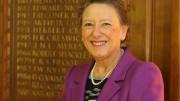Amid continuing leadership changes at the Harvard Library during a period of major reorganization, Provost Alan Garber announced on May 20 that Sarah Thomas, who currently directs the University of Oxford’s Bodleian Libraries, will be shifting her office to Cambridge, Massachusetts, in August. Thomas has been named vice president for the Harvard Library, a new position with overall responsibility for the institution. She will report to Garber; her responsibilities will include those held by Mary Lee Kennedy, formerly senior associate provost for the Harvard Library, who left in May to become chief library officer at the New York Public Library.
Thomas, who was named Bodley’s Librarian at Oxford in 2007, was the first woman, and the first non-British citizen, to hold that position in more than four centuries. (In the same year, she won the Dewey Medal from the American Library Association for “creative leadership of high order.”) Previously, she was Cornell’s University Librarian; during her tenure, that library won the Association of College and Research Libraries’ Excellence in Academic Libraries Award (2002). Thomas has also worked at the Library of Congress, where she established the Program for Cooperative Cataloging, and at the National Agricultural Library, the Research Libraries Group, and (in the early 1970s) at Widener Library.
Raised in Massachusetts, she graduated from Smith College in 1970, earned a master’s in library science from Simmons College in 1973, and a Ph.D. in German literature from Johns Hopkins in 1983. Her publications include “The Bod Squad,” in Transforming The Bodleian (2012); “The Encouragement of Learning,” in Copyright in the Digital Age (2010); “Publishing Solutions for Contemporary Scholars,” in Library HiTech (2010); and “Advancing Scholarship Through Library Collaboration,” in Die Innovative Bibliothek: Elmar Mittler zum 65. Geburtstag (2005). She has served on the Harvard Overseers’ visiting committee for the University Library and is currently a member of the Andrew W. Mellon Foundation Board, the Research Libraries UK Board, and the Smith College President’s Council, among other professional and community undertakings.
Helen Shenton, executive director of the Harvard Library, who will report to the new vice president, says, “Sarah's rich and deep experience in major research libraries in the U.S. and the U.K. will be an enormous benefit to the Harvard Library as it enters the next phase of its evolution.”








